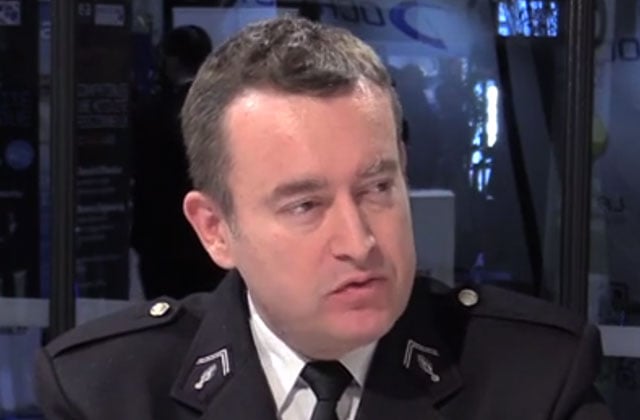- Segments
- Products and solutions
- Products and solutions
- Broadband
- Devices and accessories
- Applications
- Control Rooms
- TETRA and Tetrapol
- Customers
- Ecosystem
- How to buy
- Blog
- EN
“In the past, the gendarme has been using Internet and connectivity from the office but is now able to use all those tools on the move. The next evolution will be more interaction with the public and not only with colleagues or judges.”
The Chief Digital Strategy Officer’s team’s job is to propose and run the Gendarmerie’s digital transformation strategy.
The team comprises five permanent staff and more importantly, relies on strong partners within the organization - local correspondents and project managers, as well as the joint IT division (ST(SI)²).
Digital transformation is not a new concept for the Gendarmerie Nationale. As a large national law enforcement agency, it has changed dramatically over the last 30 years and had fully embraced digital technologies. What is new today is the need to address the expectations of users and agents more quickly and take full advantage of new technologies which appear every year at an ever-increasing pace.
It is necessary for law enforcement agencies, as well as any organization, to enter the digital revolution. This means we should be more agile and reactive, bringing to reality new projects in shorter timeframes: from a few months to a few weeks in some cases.
What is really changing is the need for more added value services that take into account the full potential of new tools - faster interfaces, large screens and the exchange of more information in the form of pictures, videos, biometric data, live feeds and location information. In addition, we need to achieve the full potential of the collected data exchanged with the growing number of partners.
The user has seen immediately that digital transformation brings tools that are less cumbersome, produce less paperwork and are more automated. These allow them to focus on action and to work more efficiently. These are the criteria for a successful transformation.
NEOgend is about putting the Gendarme’s office in his pocket, allowing him to be more mobile, and thus more in contact with the public, as well as more efficient. It is based on a secure operating system, over which we have full control, and on mainstream market smartphones. In practice, all field officers now carry a device, representing 65% of the force, and in the coming years, more than 90% of the force will be equipped.
We have seen fast increasing usage and a large growth in users accessing central databases, bringing more efficiency. Users want more tools to be added.
For the technical teams, the NEOgend platform offers more opportunities to deploy new solutions, sometimes in a few days, such as when a web application can be used.
The main lesson is the need to adapt to the specific needs of the different types of units. This is why the solution was first tested in a number of local districts before making the final deployment.
All of those. This is one of the main benefits of relying on an open platform where it is easy to share specifications for the development of tools. We can also very quickly adapt to existing developments on the platform: sharing files, secure messaging, geographic information and more. All sorts of needs can be addressed very rapidly.
In the past, the Gendarme used Internet and connectivity from the office, but is now able to use all these tools on the move. The next evolution will be more interaction with the public, not just with colleagues or judges.
In 2018, the Gendarmerie launched its online “Gendarmerie Brigade” (the name we use for stations). This online brigade responds to citizens on a 24/7 basis to provide advice on general security issues or even to provide information on current situations. Emergencies are still dealt with by phone. This online brigade is a first step to being closer to the public when they need it, and complements personal contacts, which are always available.
A new platform was launched in May 2018 to allow victims of online credit card fraud to report their cases with just a few mouse clicks - this is a first move towards online interaction.
One of the next steps is offering the option to make an appointment online, for example, for citizens to report a crime or register before leaving their home for holidays, making the lives of both Gendarmes and citizens easier. This should be launched by mid-2019.

We hope the industry will adapt to our need for agile solutions that we can interact and interface with our own or others’ solutions. We are also looking for new ideas and are willing to share our own ideas, which means not only relying on commercial relations but also developing a dynamic community around the technical needs of law enforcement.
Mobility is our main challenge. We need more than just a communications platform, we also need new interfaces to access the information to bring information automatically to the officer and adapt it to the current situation. An officer cannot be surfing on his smartphone in an operational situation.
Our next challenge of course is related to this - it is about managing, analysing and using large quantities of information, while at the same time meeting privacy legislation. When possible and useful, we also need to be able to identify and share the information we produce. We expect our partners, from local communities to infrastructure operators, to share their information. This requires open standards for the exchange of that information as well as practical implementations for all partners.
Take a look at the 15 most interesting observations from all the interviewees gathered into a printable document. Get the pdf and print out the quote that most inspires you -
The views and opinions expressed herein are those of the interviewee and do not necessarily reflect the official policy or position of Airbus.
Colonel Eric Freyssinet is the Chief Digital Strategy Officer of the Gendarmerie nationale since May 1st May 2017, after 19 years fighting cybercrime at various technical, strategic and operational positions.
His team is in charge of the implementation of the Gendarmerie's digital transformation and cyberthreats defence strategies.
After graduating from the Ecole Polytechnique (1992-1995), Eric Freyssinet pursued his professional training in IT and networks security at Télécom Paristech (advanced masters in IT security 1999-2000) and more recently defended a PhD in computer science on the topic of the fight against botnets (Paris Sorbonne Université - Faculty of Sciences, 2015). He is also an associate member of the Loria computer science laboratory.

Colonel Eric Freyssinet, Chief Digital Strategy Officer of the Gendarmerie nationale, France